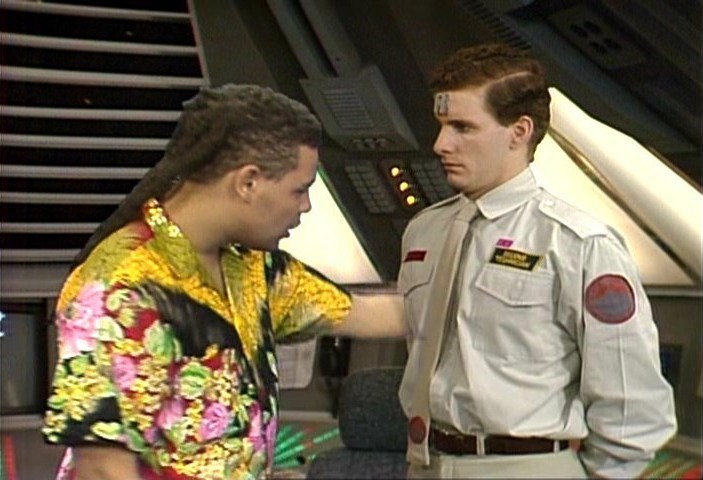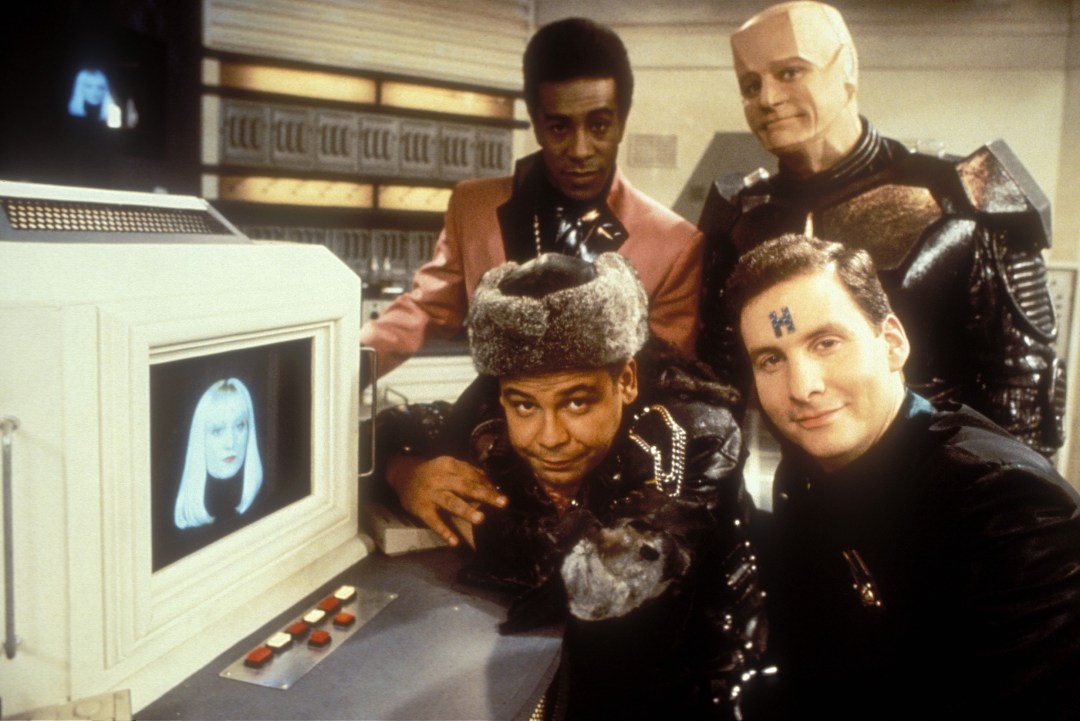In the long and strange history of Red Dwarf – spanning thirty years and two television channels, surviving the departure and return of one of its leads, the permanent departure of one of its creators and fifteen years of being terrible before suddenly, inexplicably, blessedly becoming good again – it’s always been, at its heart, an odd couple sitcom. It takes extreme versions of the Felix and Oscar archetypes and drops them into a high-concept sci-fi premise. Dave Lister (Craig Charles), a disgusting slob, is the last man alive after spending three million years in stasis aboard the Red Dwarf mining ship. Arnold Rimmer (Chris Barrie), an anal-retentive coward, was one of Lister’s crewmates, who the ship’s computer revives as a hologram to keep Lister company. The computer picks Rimmer because he’s the person Lister exchanged the most words with in his time on Red Dwarf, not factoring in that all of those words were antagonistic.
Even as Red Dwarf became more and more of an ensemble – there’s Cat (Danny John-Jules), the end result of three million years of evolution from Lister’s pregnant cat, Kryten (Robert Llewellyn), a service robot the Red Dwarf boys rescue, and the ship’s computer Holly, who is sometimes Norman Lovett and sometimes Hattie Hayridge and sometimes entirely absent for seasons at a time – the dynamic between Rimmer and Lister remained the show’s beating heart. (Which is one of the many reasons the season where Rimmer leaves sucks.) They bicker endlessly, and are at times astonishingly cruel to one another. But the arc of the show is their becoming best friends: not because either of them “develop” or become better people, really, but because they get to know one another inside out. They are, after all, the only two human beings left, even if one of them isn’t technically alive.
Red Dwarf is basically the opposite of Star Trek. The latter* envisions a hopeful future rooted in humanity’s capacity to work towards the common good; Red Dwarf envisions the complete extinction of humanity except for one guy. The Red Dwarf boys might live three million years in the future, but we learn a lot more about the time Rimmer and Lister grew up in: the late 22nd century, just a couple of decades before Star Trek: The Original Series. But where Trek is a post-capitalist utopia where almost everyone is really nice, Red Dwarf portrays a society with a rigid class system and main characters who are awful people.
Red Dwarf is the opposite of Star Trek, and so Rimmer and Lister’s dynamic is the opposite of Kirk and Spock: where Kirk and Spock are pillars of goodness and genuine soulmates pulled together through fate, Rimmer and Lister are assholes stuck together because the rest of humanity has died out. Yet they, too, end up being the most important person in each other’s lives: they spend their lives together, bunking in the same quarters, trading insults and worse, but always, ultimately, at one another’s side. Even when Rimmer leaves in season seven, the show will always end up pulling them back together, in dreams and a new Rimmer built by nanobots and – eventually and unexplained – the hologram Rimmer returned, bright metallic H on his forehead.

Rimmer is the show’s crowning achievement; a character so vividly realised that he has lived rent-free in my brain for years. I’m not sure how to describe how I feel about Rimmer, just that I feel a lot. He is cowardly and pathetic and selfish. He is snobby and elitist, obsessed with status and authority and ascending in his career even though he stalled out on the bottom rung. Before the ship’s entire crew were killed, Lister was the only person on-board that he outranked, and he clings tightly to now being the highest-ranking crewmember on the ship – which is technically true, but obviously meaningless. He quotes Space Corps directives to give himself a veneer of legitimacy, but as Kryten points out, he’s always quoting the wrong one, because he doesn’t actually know any Space Corps directives. He’s stupid and misogynistic and unbearably petty. Rimmer is just a dick, in a way that’s both all-encompassing and ineffable. He makes me so sad I can hardly breathe.
Rimmer is a bad person, bad in ways that are not because of the terrible things that have happened to him. And yet so many terrible things have happened to him.
Rimmer’s father, rejected from the Space Corps for being an inch below regulation height, became fixated on his sons’ succeeding where he had failed, leading to horrific abuse of Rimmer in particular. The boys weren’t allowed eat unless they could answer complicated astro-navigation questions, and so Rimmer – poor, doltish Rimmer – almost died from malnutrition. Their father stretched them on a rack to make them taller.
Rimmer’s mother was cold and uncaring: in an episode where Rimmer makes a copy of himself, the two of them argue the point, with the copy saying she didn’t love him, and Rimmer weakly arguing that she was “busy”. Rimmer and his copy also argue about why his parents didn’t send him to the Academy, and Rimmer’s claim that his father didn’t have enough money doesn’t hold much water when his copy points out that all of his brothers were sent. His brothers tortured him as a child – once, when he asked if they could make a swing, they hung him upside-down from a tree tied by his ankles – and they all became successful Space Corps officers while Rimmer was a second technician, one rank from the bottom, repairing vending machines. By the time the show starts, he’s taken the astro-navigation exam nine times – “ten, if you count the time I had my spasm” – without passing.
Lots of sitcoms have a persistent undercurrent of sadness. Tragic backstories that are only glimpsed out of the corner of your eye, stuff played for laughs that could swallow you whole if you stopped to think about it. Diane’s anxiety and depression on Cheers, which led to a stint at a mental hospital, Phoebe’s turbulent childhood – punctuated by her mother’s suicide and bouts of homelessness – on Friends, or whatever unspoken tragedies led to the Brady Bunch union. These shows are designed for us to not think too much about these things: tragedy is a close-up and comedy is a long shot, after all, and so we bounce along to the next wacky adventure. But these glimpsed tragedies are there, insistent at the edge of the frame.
But the terrible things that have happened to Rimmer do not lurk at the edge of frame. They are front-and-centre, because he insists on putting them there. He talks about the horrible things that have happened to him all the time. Sometimes, it’s because he’s internalised this stuff as normal, or even has deluded himself into believing it makes him superior. (Rimmer is posh and Lister, his only living point of comparison, is very much not: in Rimmer’s mind, all points of difference become evidence of class position.) “Shiny clean boots and a spanking short haircut, and you can cope with anything,” he claims his father told him. He states it like evident wisdom, even though his father said that right before what Rimmer calls “that unfortunate suicide business”.

But more often, Rimmer knows just how awful the stories he nonchalantly tells are. He feels sorry for himself, and he wants everyone else to feel sorry for him too. On his psi-moon – a moon terraformed to reflect Rimmer’s psyche – the monster that is a manifestation of his self-loathing is so powerful it almost kills them all. To escape, Lister and Kryten tell Rimmer they like and respect him; the second they make it to safety, they take it back. Lister never indulges Rimmer’s self-pity, even when it’s legitimate: when Rimmer tells a story about his only friend at school ringleading a plan to cook and eat him on a Space Scouts survival course, Lister says he was “only bullying” him.
Every bad thing that has happened to Rimmer is an excuse for why he is the way he is, a shield against any kind of responsibility. It’s simultaneously self-defence and self-harm. He evades blame for his actions and his failures, but it’s a superficial self-protection, one that not only fails to deal with the torrent of self-loathing inside him but makes dealing with it impossible. He despises Ace Rimmer, a version of Rimmer from another universe who is heroic and successful, on sight: he rants to Lister that this Rimmer must have gotten all the lucky breaks, where he got nothing. But the only difference is that Ace Rimmer was held back a year at school and our Rimmer wasn’t. This made Ace Rimmer start to “fight back”, something our Rimmer – three million years later, still trying to fulfil his father’s dream of being a Space Corps officer – never did.
In the season 12 episode ‘Skipper’, Rimmer uses a quantum skipper to travel from universe to universe. “A chance for a new life, a fresh start. New people. Better people,” he says.
“Maybe there’s another universe out there where he isn’t such a giant loser,” Cat says.
So Rimmer bounces from universe to universe, each worse than the last, until he finds one where he has everything he’s ever wanted. He’s not a hologram, but actually alive; he is a navigation officer; he is married with four children. Someone even does the dumb salute he’s been trying to make a thing, unprompted. It’s exactly what he dreamed of.
Then he walks into his meeting with the ship’s captain, and it’s Lister.
Rimmer can’t stand it. He’s so petty and jealous and weird that even though he’s gotten everything he wanted, Lister being more successful than him taints it beyond measure. “It’s not worth it,” he says, “The pain of it would be too much.”
It is, on the surface, the most Rimmer thing ever. That he genuinely has that much of a superiority complex that he would rather give up all his dreams – a wife, a career, life itself – than live in a world where Lister is doing better than him.
And yet. He quantum-skips back to his home universe and smashes the skipper. He sits down at the table with Lister and Cat and Kryten to play poker. “Somewhere, a different version of you is living out the opposite of all your decisions,” Lister says earlier in the episode, when Kryten is explaining how the quantum skipper works. “What a life he must be having, that lucky bastard,” Rimmer says, ruefully. But he was given infinite universes to choose from, and he chooses this one. He chooses a game of poker with Lister, Cat and Kryten. He is petty and jealous and weird, an absolute fucking dick, but after thirty years, he has figured out where he belongs.
* Star Trek.

One thought on “Gutless, Spineless, Gormless, Directionless, Neurotic, Underachieving, Cowardly Pile of Smeg: The Arnold J. Rimmer Story”